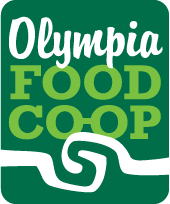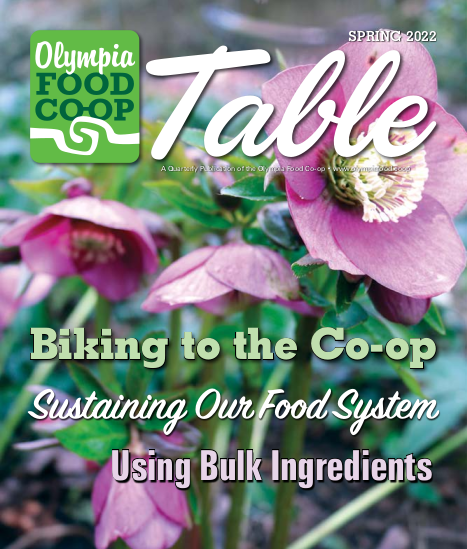Supporting a Resilient and Sustainable Food System
By Maureen Tobin, Staff member
In my time at the Co-op, the question of how to plan for the future, in a collectively-managed, consensus-based organization, has always been a topic of conversation. Sometimes on the front burner and sometimes on the back, the additional layer of need to address climate change and our ecological footprint as we plan and create ideas has been added to the bigger questions. What are the best ways for the Co-op continue to meet our mission and goals in the face of all these factors?
Recent studies suggest that more than a third of all human-made greenhouse gas emissions are generated by food systems. They also show that food generates an average of 2 tons of carbon dioxide equivalent (CO2e) emissions per person annually. One thing we can all do is to maximize our consumption dollars in the best ways possible. While consuming less is the best way to achieve a smaller “eco-foodprint,” we all still gotta eat! Here are some ideas about ways to shop for food while supporting a more sustainable food system.
Support local production
Transportation and food packaging requirements to help food travel well create huge environmental footprints, so focusing on how you can support local agriculture and other local food businesses will be an essential part of our community path to sustainable eating. The Co-op works hard to make sure local produce and products are found on our shelves throughout the year, with so many farms and companies to mention, the list is rather long.
Investing in a CSA, or a community supported agriculture share from a local farm, is another great way to reduce your food footprint, sustain local livelihoods, and fight climate change. You can find an exhaustive list of local farms offering CSAs- many of them still have room for 2022 shares- at communityfarmlandtrust.org/2022-csa-guide as well as the latest Fresh from the Farm Guide appearing this spring.
Shop in bulk and avoid excessive food packaging
All food packaging has an impact on the environment, responsible for many problems including raw material extraction, litter on both land and in the ocean, and emissions. Even biodegradable products come with an ecological price tag. That’s why choosing durable and re-usable containers, and then reusing them, is a key step in this chain. Food packaging can also generate and contain chemicals that are harmful to human and animal health.
Single use plastic is taking a huge toll on our earth and the Co-op has been working to reduce the amount of items that fall into this category on our shelves. But we all have a long way to go to solve the plastic dilemma! Each shopper can help by choosing to reduce and reuse by sharing larger containers holding bulk foods.
Choose companies with sustainability ethics:
We work to maximize shelf space for both locally produced goods and also the best selling natural food products available from companies who share the goal of reducing the food production footprint through a variety of means. We work to highlight companies with ethical labor practices such as fair trade sourcing and ownership/employment opportunities for less-served communities, such as BIPOC and women.
A few companies to explore include OlyKraut, Quickie Too, Mel O Soup, Frontier Natural Products, Organic Valley, Nancy’s Creamery, Siete Family Foods, Nature’s Path, Ajiri Tea, Numi Organic Teas, Inspired Earth Tea, Alvarado St Bakery, Barnana, One Degree Foods, and Equal Exchange, naming only a few!
Spread the Joy of Cooking
One of the best ways to make sure you are utilizing whole food ingredients with less packaging is to take a do-it-yourself attitude towards more ingredients. Everyone is busy and no one is perfect, but taking on even a couple of new recipes in life can dramatically impact how you shop, eat, and enrich your life with more great food. My recent goal is to try making pasta (a staple in my house) by hand at least a few times as Monica suggests in this issue. No plastic bag involved!
Reduce food waste and compost scraps
Cooking with a plan to minimize food waste is another way to reduce your foodprint. Food waste is a huge contributor to lost money in your wallet as well as methane emissions in our landfills. So, making sure you cut up that cucumber and eat a salad before it goes moldy is actually a really big deal! And if you do fail to see that lost cuke in the back of fridge, keeping it out of the landfill is your next step in the right direction. Backyard compost, worm bins, or the yard waste bins from the city are all ways to keep biodegradable stuff out of our landfills, thereby cutting back on climate change contributors.
I’m sure lots of Co-op shoppers have more ideas on ways to create a better world for our community now and for those who follow. Let’s keep up the conversation as we celebrate 45 Years in 2022!

